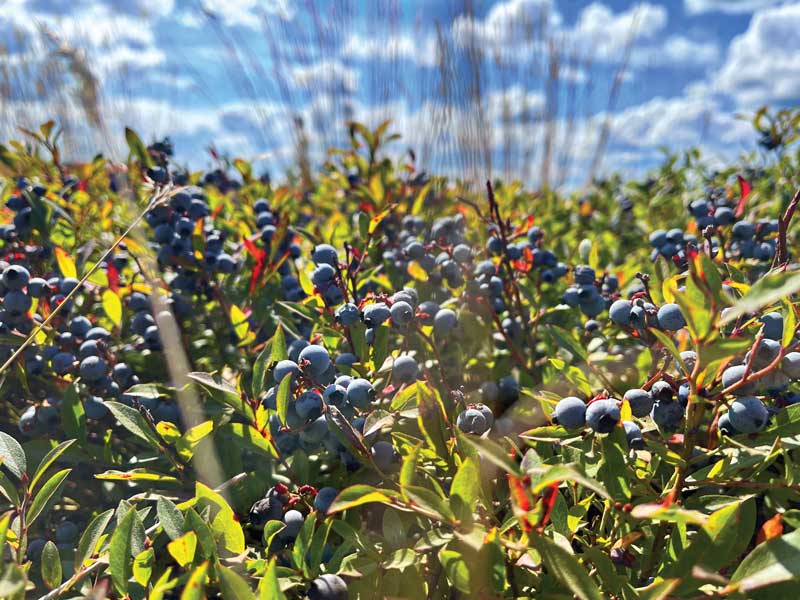 Plants laden with blueberries that are ready for harvest at the Passamoquoddy Wild Blueberry Company. Photo courtesy PWBC
Plants laden with blueberries that are ready for harvest at the Passamoquoddy Wild Blueberry Company. Photo courtesy PWBC
A wise person once said, “you don’t try wild blueberries, wild blueberries try you,” speaking in reference to Maine’s most storied wild crop, and it’s evident. Drive a few miles on a country road nearly anywhere
in Maine and you’re likely to round a corner only to be greeted by vast rolling red fields that will grow green and thick with purple berries as the late summer harvest season approaches. These majestic fields are the ancestral home to small but mighty and rugged plants laden with one of Maine’s most prized natural delicacies: wild blueberries.
Harvested statewide, the wild blueberry is part of Maine’s personality, and—like lobster—it’s undeniably part of its history, its culture, and, inevitably, its brand.
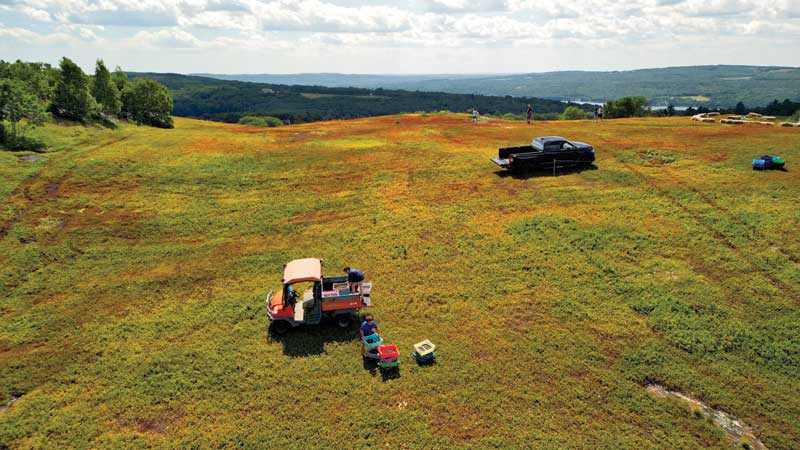 At the Brodis Blueberries barren, the family’s ninth generation is collecting harvest baskets. Photo by Alison McKellar/Courtesy Brodis Blueberries
At the Brodis Blueberries barren, the family’s ninth generation is collecting harvest baskets. Photo by Alison McKellar/Courtesy Brodis Blueberries
The history of the Maine wild blueberry is longer than that of the state itself; the fruit was initially harvested by Native Americans and utilized for an astonishing variety of purposes.
“The Passamaquoddy and other Wabanaki tribes were the first to harvest wild blueberries. Traditionally, they used the berries as sustenance, as dyes, and as medicine. The Passamaquoddy clearly knew long before science confirmed it that food is medicine, and the antioxidant concentration and anthocyanins wild blueberries offer can help keep our bodies healthy,” said Holli Frances of the Passamaquoddy Wild Blueberry Co.
Eric Venturini, executive director at the Wild Blueberry Commission of Maine, echoed the cultural significance of the Maine wild blueberry, as well as its uniqueness.
“Wild blueberries emerged on the desolate plain, aptly called the Barrens of Maine, and Atlantic Canada and Quebec, following the retreat of the glaciers more than 10,000 years ago. Unlike ordinary blueberries, wild blueberries are not planted. Instead, they are indigenous and spread naturally where Mother Nature put them. Each plant is genetically distinct, culminating in 100 genetically different varieties in every acre of land. The Wabanaki tribes of Maine and Canada were among the first people to use wild blueberries, both fresh and dried, for their flavor, nutrition, and healing qualities,” Venturini said.
“Wild blueberries have never been hybridized or genetically modified to enhance or alter naturally occurring characteristics. This diversity is what gives wild blueberries their intense, delicious, sweet-tart taste and their spectacular blend of complex flavors,” he added.
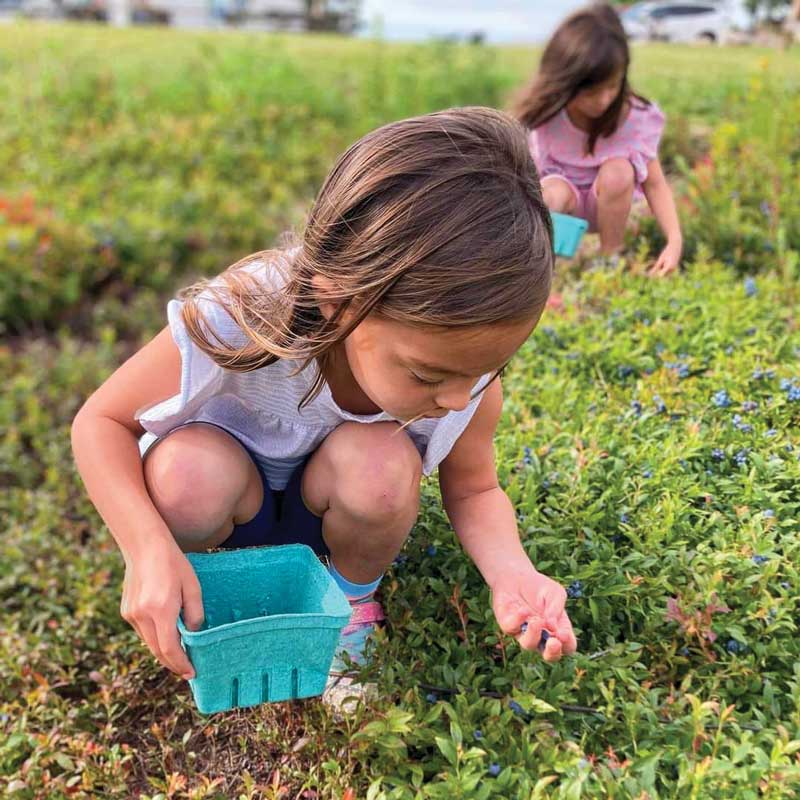 Photo by Alison McKellar/Courtesy Brodis Blueberries
Photo by Alison McKellar/Courtesy Brodis Blueberries
Today, harvesting wild blueberries is also a valuable industry for the state. Based on the most recent published statistics from the 2022 U.S. Census of Agriculture, Maine has 46,370 acres of wild blueberries stewarded by 512 farms. In 2021, Maine harvested 103 million pounds of the berries, which brought $361 million into the state through direct and out-of-state sales, according to the Camoin Associates Wild Blueberry Economic Impact Study, provided by the WBCM.
With the growth of mechanical harvesting practices, a heritage industry and a way of life has found itself balancing tradition, quality, culture, and efficiency. That means tough decisions about incorporating machinery while still preserving the quality and tradition of the centuries long hand-harvest.
Venturini spoke to the costs associated with wild blueberries, reporting that the two greatest expenses for wild blueberry farmers are renting beehives for pollination and the cost of the harvest.
He noted that hand raking is expensive, however, it typically produces a higher quality of fruit that will maintain a longer shelf life as a fresh product. He said that numerous growers who sell fresh—never frozen—wild blueberries rely exclusively on hand raking.
Frances shared that of the 2,000 acres of land that PWBC harvests, about 20 percent of the harvested berries are hand raked. “It’s more delicate on the berries, and hand-raked fields have a better yield per acre than mechanically harvested,” she said, but noted, “It’s hard to find enough people willing to rake—it isn’t an easy job.” PWBC, she added, uses “as many rakers as we can; it used to be over 700 rakers but now we get around 100.”
There is a culture and way of life that surrounds the migratory nature of working respective crops, and the time of year that they are ready for planting and for harvest. “The Passamaquoddy were traditionally migratory, meaning they would travel with the harvests produced by the Earth. This continued into modern-day agriculture, with many tribal members migrating between potato, wild blueberry, maple syrup, and [spruce] tip harvests,” Frances said.
Still, mechanical harvesting has its advantages, and can maximize efficiency while minimizing overhead.
“Mechanical harvesting equipment can be as simple as a small lawn mower-sized machine with two wheels and a rotating head that slowly pulls rakes through the plant stems, separating the wild blueberry fruit from the stems. Similar to hand raking, experienced machine harvesters are worth their weight in gold and produce cost-effective, high-quality fruit. Machine harvesting is a particularly cost-effective choice in fields that have fewer rocks and boulders, and a smooth topography,” said Venturini.
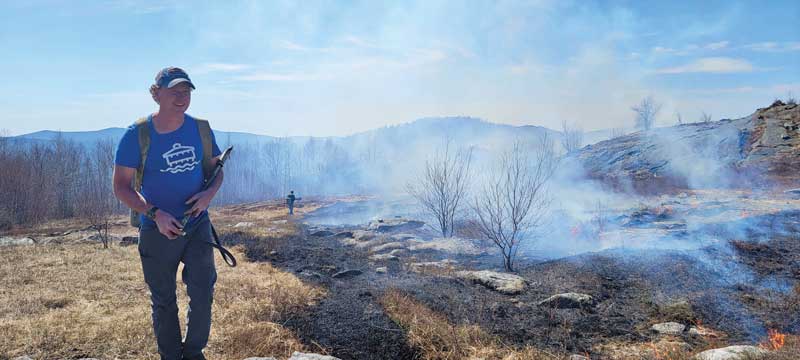 Jeremy Howard works on field maintenance at Brodis Blueberries in Hope. Photo courtesy of Heidi Baker
Jeremy Howard works on field maintenance at Brodis Blueberries in Hope. Photo courtesy of Heidi Baker
PWBC often sends in a hand-raking crew after the mechanical harvesters to maximize yield. Frances explained that the mechanical harvesters, while efficient, leave more berries in the field than a human raker. Additionally, the quality of the fruit can be compromised.
Mechanically raked harvests are likely to have more smashed berries just because of the nature of a harvester. Meanwhile a mechanical harvester bin stores more berries than a hand-raking bin, so berries on the bottom are more likely to get crushed, according to Frances.
Keeping the fields healthy year after year is another concern because they require consistent maintenance.
“Maine’s wild blueberry growers are stewards of lands that, in many cases, have produced wild blueberries for thousands of years,” said Venturini. “These stewards maintain productive fields by carefully following research-based recommendations from the University of Maine’s wild blueberry research and extension team. Fields are harvested only every other year. After harvest, the plants are mowed to the ground, or more traditionally, burned. In the following year, the rhizomatic root systems send up new shoots and leaves, which harvest the sun’s energy for a full year without producing flowers or fruit. It is only in the second year that the plant produces fruit—when it has harvested enough photosynthetic energy and soil nutrients over the two-year cycle to support fruit production, after which it is mowed to the ground again, and the cycle starts all over.”
For some of the state’s blueberry producers, harvesting and maintaining fields in different locations is part of their business model.
For Mark and Renata Scarano, owners of Blue-Zee Farm in Penobscot, a network of fields provides them with the requisite volume of blueberries their business requires. Blue-Zee is Maine Organic Farmers Association (MOFGA)-certified.
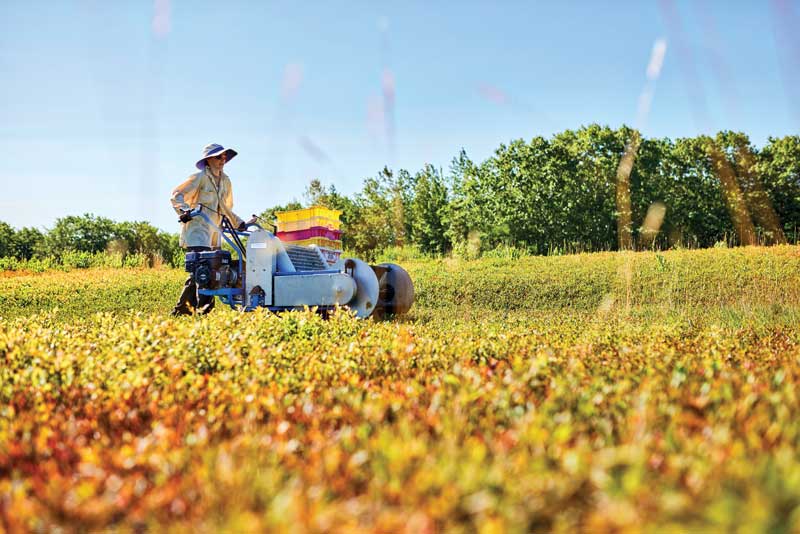 Grower Ashley Field uses a mechanical raker at Fields Blueberries in Dresden. Photo courtesy the Wild Blueberry Commission of Maine
Grower Ashley Field uses a mechanical raker at Fields Blueberries in Dresden. Photo courtesy the Wild Blueberry Commission of Maine
“We have several fields spread throughout the [Blue Hill] peninsula, some are ours, some are rented. We mainly harvest with our walk-behind machine, but depending on the field and conditions, we may harvest with a hand rake, it all depends on the weather,” they wrote.
The Scaranos began their journey to restore an old blueberry farm to its former glory in 2007. “From the soils we carefully nurture, we’ve been steadily committed to growing the healthiest food, protecting our environment using time-honored organic practices. We strive to be good stewards of the land, so that our generation and future generations may continue to be nourished by the healthy and vibrant food produced on this land,” the Scaranos reported.
At the multigenerational Brodis Blueberries in Hope, Heidi Howard Baker said that they harvest about 170 acres of berries, and they separate their fields into halves which are each harvested biannually.
For her extended family, this generation is the ninth to work their blueberry barren.
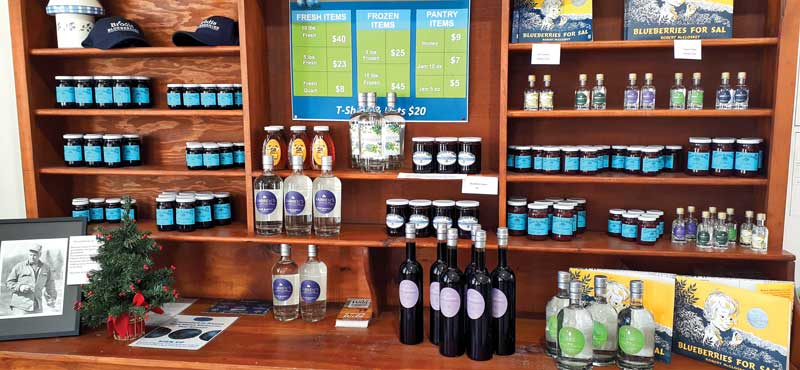 The store at Brodis offers many products in addition to fresh and frozen blueberries. Photo courtesy of Heidi Baker
The store at Brodis offers many products in addition to fresh and frozen blueberries. Photo courtesy of Heidi Baker
“Traditionally we did all our harvesting with hand rakes. A few decades ago, we did a lot of work to remove rocks and level the ground, which allowed new mechanical harvesters to be operated on much of the ground, but on the rougher ground we still use hand rakes. We also always hand-raked every berry we sold as fresh fruit, but a couple years ago we invested in a new mechanical harvester that is just as gentle on the berries, which has been wonderful,” Baker said.
Baker noted she’s seeing slight changes to the timing of the harvest, based on conditions and geography. Throughout Maine the ideal harvest time can deviate slightly.
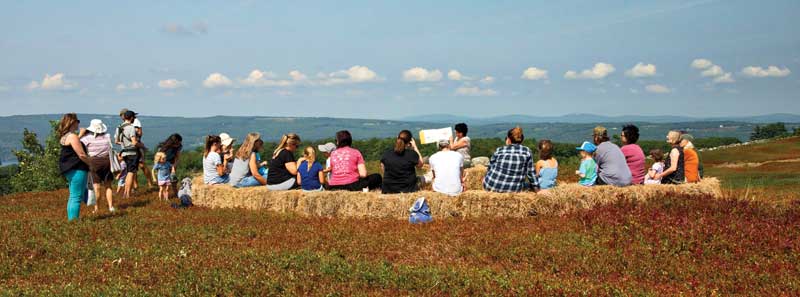 Visitors enjoy a reading of Robert McCloskey’s Blueberries for Sal during Wild Blueberry Weekend at Brodis Blueberries. Photo courtesy Brodis Blueberries
Visitors enjoy a reading of Robert McCloskey’s Blueberries for Sal during Wild Blueberry Weekend at Brodis Blueberries. Photo courtesy Brodis Blueberries
“Harvest traditionally started the first of August, but in recent years, given the warming environment, the berries have blossomed and ripened earlier, with harvests starting the third week of July. Here in the midcoast we are usually about a week ahead of the downeast farmers, who are starting closer to August 1. We hire approximately 35 people to help with harvesting, inspecting, and packing our berries. Last year this included 15 of our own family members over four generations, which we love!” Baker said. Like other farms, Brodis Blueberries offers a variety of value-added products that are available year-round.
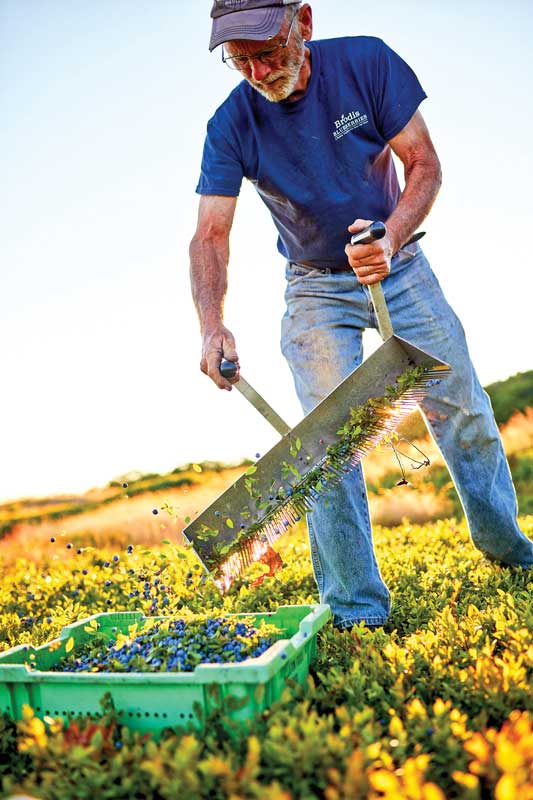 Ron Howard rakes by hand at Brodis Blueberries, a process of scooping up berries and depositing them in crates over the course of a nine-hour day. Photo courtesy Brodis Blueberries“We not only sell fresh wild blueberries every summer, but have frozen available most of the year along with jams, sauces, pies, and muffins. My brother Jeremy [Howard] co-owns Blue Barren Distillery, and several of their spirits include our wild blueberries in the distillation. Being able to offer a variety of wild blueberry products and building our farm store and distillery on the farm has helped our customers connect with our land, our ancestry, and relate to our commitment to keep Brodis Blueberries sustainable,” she added.
Ron Howard rakes by hand at Brodis Blueberries, a process of scooping up berries and depositing them in crates over the course of a nine-hour day. Photo courtesy Brodis Blueberries“We not only sell fresh wild blueberries every summer, but have frozen available most of the year along with jams, sauces, pies, and muffins. My brother Jeremy [Howard] co-owns Blue Barren Distillery, and several of their spirits include our wild blueberries in the distillation. Being able to offer a variety of wild blueberry products and building our farm store and distillery on the farm has helped our customers connect with our land, our ancestry, and relate to our commitment to keep Brodis Blueberries sustainable,” she added.
“Since wild blueberries have never been planted by humans, we don’t think of our practices as ‘cultivating’ the way most farmers do. Rather, it is more about stewarding the land, taking care of it, and sharing the bounty,” Baker said, adding that blueberry farms cultivate wildflowers and ancillary plantings to attract pollinators which are vital to a successful crop.
Baker, among others, is looking forward to the beginning of August. That’s when the Blueberry Commission kicks off its fourth annual Wild Blueberry Weekend. This year, it’s scheduled for Saturday and Sunday, August 3 and 4, 2024. The event happens across the state with more than a dozen farms opening their doors to visitors, and approximately 50 businesses hosting wild blueberry-themed events. Many farms see thousands of visitors during the weekend; and they entertain them with a diverse array of offerings including music, farm tours, and hikes through the scenic fields.
Fresh Maine wild blueberries are the focal point, of course, and details can be found at wildblueberryweekend.com.
“For people to learn more about Brodis Blueberries and our wild blueberries, we join with other farmers the first full weekend of August each year in hosting Wild Blueberry Weekend,” Baker said. “Activities for the public include food trucks, games, and a special reading of Blueberries For Sal high on one of our wild blueberry hills!”
✮
Jenna Lookner is a freelance writer. She grew up on a farm in Camden and lives in Little Deer Isle with her husband, their four dogs, heritage breed chickens, and geese.
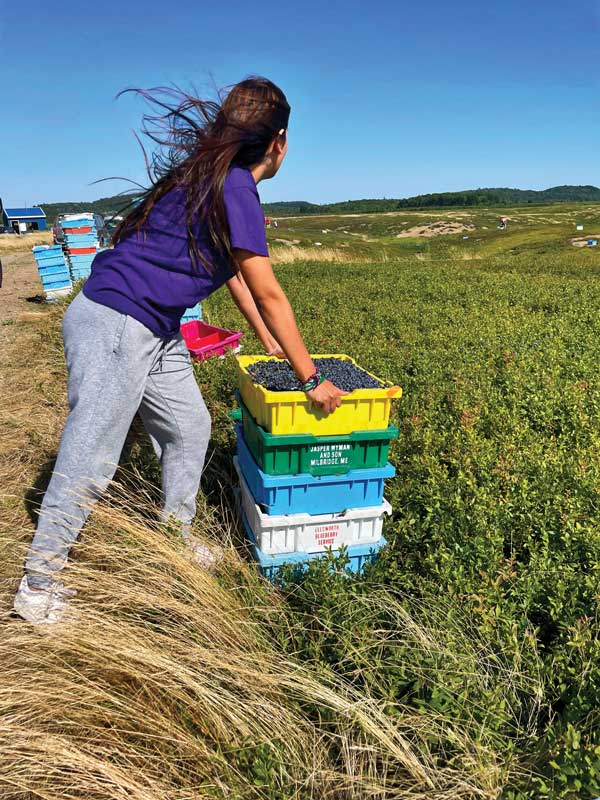 A field worker surveys the barren during the harvest by the Passamoquoddy Wild Blueberry Co. Photo courtesy PWBC
A field worker surveys the barren during the harvest by the Passamoquoddy Wild Blueberry Co. Photo courtesy PWBC
By the Tribe, For the Tribe
Compared to other Maine berry harvesters, the Passamaquoddy Wild Blueberry Co. works in an especially unique way.
“We keep 20 percent of our annual harvest to sell under our own brand,” said Holli Frances. Berries are packed in individual quick freezing 30-pound cases and also used for the company’s new freeze-dried wild blueberries. “The other 80 percent is sold to a processor to use as their own brand,” Frances added. “Until 2021, the company sold 100 percent of its berries to a processor to use under its own brand so this is still a relatively new market for us, yet we have seen success. We’re grateful for so many of our customers who are willing to share the tribe’s story with wild blueberries and support our communities.”
As a Section 17 Corporation, PWBC is owned by the tribe—not by an individual. The company’s annual profits are reinvested in the company—which employs tribal members—or they are distributed to the two Passamaquoddy reservations in order to provide financial support for economic and community development.
“The PWBC is the single largest non-processor wild blueberry grower in Maine with approximately 2,000 acres of harvestable land,” noted Eric Venturini, executive director of the Wild Blueberry Commission of Maine. “It has been an absolute pleasure over the last few years to witness the company’s growth into their own branded products, and to support their efforts whenever and wherever we can. For example, PWBC was recently awarded a contract to supply wild blueberries to schools across the country. They are now supplying a market that our organization has built up over the last seven years through our School Nutrition Program.”
✮






